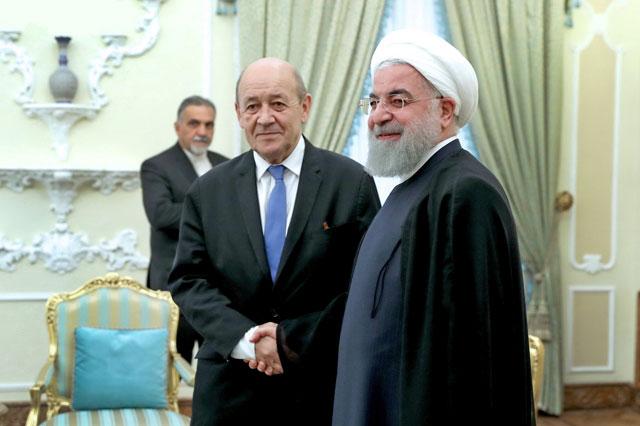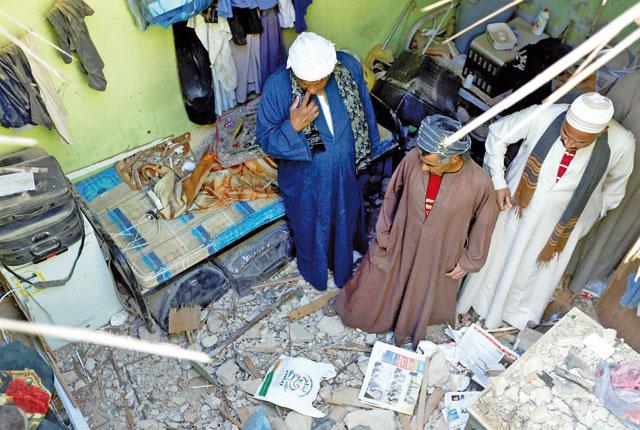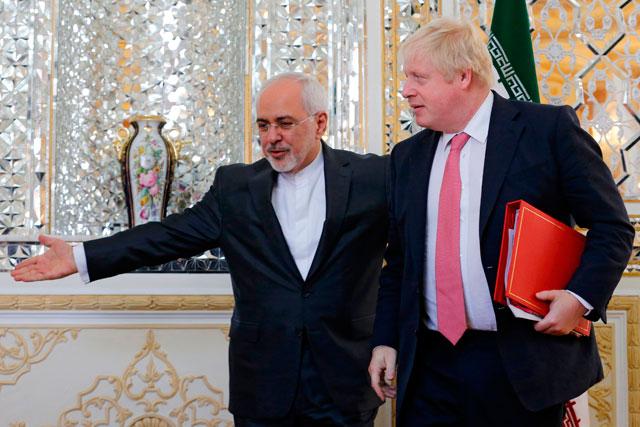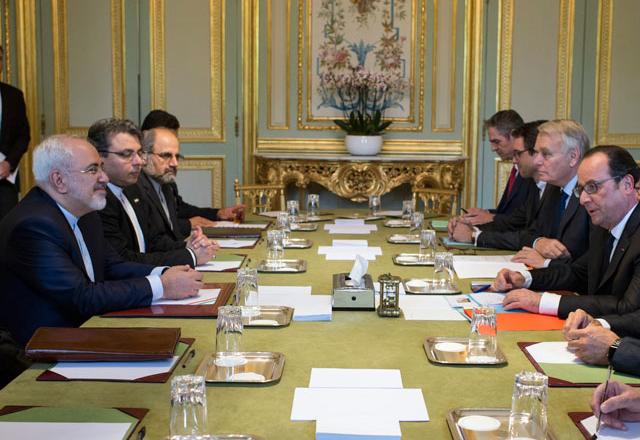You are here
Iran rebuffs French FM demands to curb missiles on Tehran visit
By AFP - Mar 06,2018 - Last updated at Mar 06,2018

Iranian President Hassan Rouhani shakes hands with French Foreign Affairs Minister Jean-Yves Le Drian during their meeting in Tehran, Iran, on Monday (Reuters photo)
TEHRAN, Iran — Iran rebuffed French Foreign Minister Jean-Yves Le Drian's calls to curb its missile programme after a day of tense discussions in Tehran on Monday aimed at salvaging its historic nuclear deal.
Le Drian said there was "still a lot of work to do" on Iran's missile programme after meeting with top officials, including President Hassan Rouhani and Foreign Minister Mohammad Javad Zarif.
Zarif countered that Europe needed to "play a more constructive role to preserve" the nuclear deal.
"And above all to put pressure on the United States to meet its commitments under the deal and not to allow it to present illogical and illegal demands," Zarif added, according to an account by the foreign ministry.
The visit comes in the midst of a scramble by European governments to salvage the 2015 deal after US President Donald Trump threatened he would abandon it unless tough new restrictions were placed on Iran before May 12.
Rouhani issued a statement after meeting Le Drian, saying, "Preserving the nuclear accord will prove to the world that negotiation and diplomacy are the best option for solving problems, while its collapse will signify that political negotiations are a waste of time".
Le Drian has insisted he is not "an emissary of Trump", but he has taken a firm line on Iran's missile programme and regional interventions that mirrors the rhetoric from Washington.
"There are programmes for missiles with ranges of several thousand kilometres which are not in line with UN Security Council resolutions and go beyond what is needed to secure Iran's borders," Le Drian told Le Journal du Dimanche on the eve of his visit.
France has ballistic missiles with ranges of more than 6,000 kilometres, which can be launched from submarines, but Le Drian said Iran was risking fresh sanctions if it did not curb its missile programme, which is currently limited to 2,000 kilometres.
His statements have not been warmly received in Iran, with Zarif telling Monday's reformist Etemad newspaper: "In order to keep the United States in the Iran nuclear deal, European countries are suffering from extremism and this will ultimately undermine Europe's policy."
The hardline Javan newspaper welcomed Le Drian with the headline: "Trump's Parisian lackey in Tehran".
‘Heavy concerns on Syria'
Le Drian also pressed Iran on the activities of its ally, the Syrian government, amid the ongoing bombardment of civilians in the rebel enclave of Eastern Ghouta near Damascus.
"The Iranian authorities told me of their heavy concerns on the humanitarian situation in Syria and their desire to see an end to this catastrophe," Le Drian told reporters.
Rouhani re-emphasised Iran's position that the only way to resolve the Syrian crisis is to "support its central government".
But the key focus has been the 120-day deadline set by Trump in January for US lawmakers and European allies to "fix" the nuclear deal, removing "sunset clauses" that mean it expires in 2026 and reining in Iran's missile programme and regional activities.
Iran has refused any re-negotiation or additional clauses, arguing that the US has already failed to keep up its end of the bargain on the existing accord.
Despite Le Drian's tough talk on missiles, France remains firmly behind the agreement.
"We want to preserve the nuclear deal because it is working, it's robust and because the Iranians are respecting it," his team told AFP ahead of the visit.
The International Atomic Energy Agency has repeatedly found Iran is abiding by its commitments, which curbs its nuclear programme in exchange for a lifting of international sanctions.
IAEA director general Yukiya Amano said on Monday that losing the nuclear deal "would be a great loss for nuclear verification and for multilateralism".
France's reengagement
If the political track looks tricky, France is hoping its cultural diplomacy can offer a more positive flavour to the trip.
On Monday, Le Drian inaugurated an "unprecedented" show of items from the Louvre in Paris at Tehran's National Museum.
"Relations between France and Iran are old and profound because France was a pioneer of archaeological exploration here," said Jean-Luc Martinez, president of the Louvre.
Despite their differences, Iran has broadly welcomed France's efforts to re-engage with the country.
Last year's $5 billion gas exploration deal with French energy giant Total was the biggest in Iran since the nuclear accord, and showed French firms were willing to stand up to pressure from Washington.
Related Articles
PARIS, France — France on Thursday accused Iran of supplying weapons to Houthi rebels waging a three-year fight against a Saudi-led coalitio
BEIRUT — Iran's foreign minister on Monday defended its ballistic missile programme and urged European countries not to be influenced by US
PARIS — Iran's foreign minister, making the rounds of European capitals to seek benefits from a nuclear accord, is holding a string of meeti














